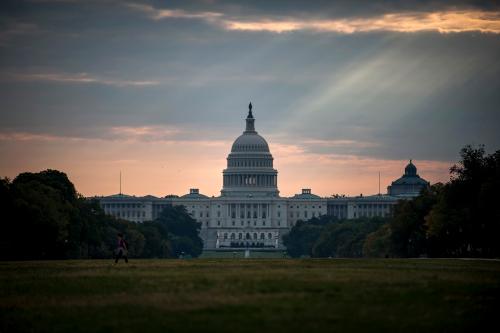This article originally appeared on The Hill on January 9, 2017.
With the new Congress sworn in, it’s once again the beginning of the annual federal budget season. That’s not a pretty sight. The federal budget process is deficient enough in delivering orderly and timely appropriations for annual spending. But the process is even less effective in nudging the new Congress and White House to budget for the long term, especially when it comes to making prudent commitments for major entitlements, such as Medicare and Social Security, and assuring adequate future revenues.
One reason for this is the limited “budget window” in federal budgeting – normally 10 years. This means a vote to approve the projected long-term debt and deficit consequences of a tax cut or entitlement change is not even part of the regular budget process. Worried about projections showing dangerous increases in future deficits and the debt/GDP ratio, ideologically diverse budget analysts have been calling for more focus on the long term in budgeting. Many experts see gradual economic erosion as the real concern. As my Brookings colleague Isabel Sawhill long ago described the problem of long-term commitments, these “fiscal termites in the economic woodwork will bring down the house.”
It’s not that Congress and the Administration lack long-term budget projections. For instance, the Congressional Budget Office (CBO) regularly produces a 30-year budget outlook, complete with warnings about the risks posed by long-term deficit and debt trends – such as rising government debt crowding out savings for investment. The trustees of Medicare and of Social Security even provide 75-year projections for their programs.
The problem is that such projections do not play a central role in the legislative process for making budget decisions that have long-term fiscal and economic implications.
That needs to change. So Maya MacGuineas, of the Committee for a Responsible Federal Budget, and I recently proposed a way to do that. We recommend creating a statutory long-term budget for major entitlements – and the revenues to finance these programs – as a central part of the federal budget process. We would also include tax expenditures, such as the mortgage interest deduction and special credits that benefit specific groups and are largely outside the regular budget process.
We set modest but, we think, politically achievable objectives for the reform. We do not propose rigid, multi-decade caps on entitlement spending or floors on revenues. It’s doubtful they would be politically enforceable, and in any case would be unwise; conditions and national goals change over time, so long-term budgets must retain flexibility.
Rather, we recommend a procedure whereby Congress would debate and enact a 25-year spending plan for the major entitlements with a clear plan to cover their cost. Such a plan could increase deficits and debt or reduce them; it could raise taxes or cut them; it could accelerate entitlement growth or slow it. But the key point is that Congress would have to present the American people with a 25-year plan for these major commitments and go on record in voting for it. So it would be clear where we were headed and what the tradeoffs were likely to be.
Because conditions and national goals do change over time, we call for a formal review every four years, after each presidential election. For the review, Congress would receive a comprehensive CBO report on long-term trends in the programs and revenues included in the plan. But the current plan would remain in place unless Congress and the President agreed on changes. During the review, Congress would also add four years to the previous plan so it’d always been looking 25 years ahead.
Separate from this quadrennial review, Congress could still make budgetary changes in entitlements or revenues, and agencies could make decisions with long-term budgetary implications. But CBO would report on the 25-year implications of any new or amended program. If the changes caused spending or revenues to depart significantly from the long-term budget, then there would have to be a high-visibility vote to revise the long-term budget.
So the proposed long-term budget would not be a straitjacket on each succeeding Congress. It allows for some flexibility and adjustment of the default long-term budget. But by requiring full disclosure of the long-term consequences and a new long-term budget statute whenever Congress wanted to make significant changes, there would be a political brake on expanding long-term deficits and debt that does not exists today.
What about enforcing the provisions of a long-term budget? Hard experience tells us that if members of Congress find a budget constraint to be politically uncomfortable they will ignore or evade it. In particular, automatic triggers typically are tough to sustain politically (Exhibit A: The many times Congress simply suspended Medicare physician fee reductions required under the Balanced Budget Act of 1997 – referred to as the “doc fix”).
The key to enforcement may be to combine public pressure and an action-forcing outside body with flexibility within Congress on ways of keeping on track. The public prominence of a long-term entitlements and revenue budget would exert a dose of political pressure on Congress to stick with the process. And learning from the political success of the Defense Base Realignment and Closure Commission (BRAC), our proposal opts for creating a commission, selected by Congress and the President, to fashion a package of steps to keep to the long-term budget. But while the commission’s package of adjustments would automatically go into effect unless Congress took action, the proposal allows for substituting an alternative package created by a bipartisan supercommittee of congressional leaders. We think this “inside-outside” structure has a good chance of working politically.
This is one way to incorporate long-term considerations into the budget process. Maybe there are better ideas to consider. But whatever approach is most promising, America desperately needs a long-term budget for entitlements and the revenues to support them. The budget process must reflect the fact that commitments associated with these important programs have profound long-term implications for America’s fiscal and economic future, and for our remaining capacity to pursue other national goals.










Commentary
Op-edAmerica desperately needs a long-term budget for entitlements
January 9, 2017